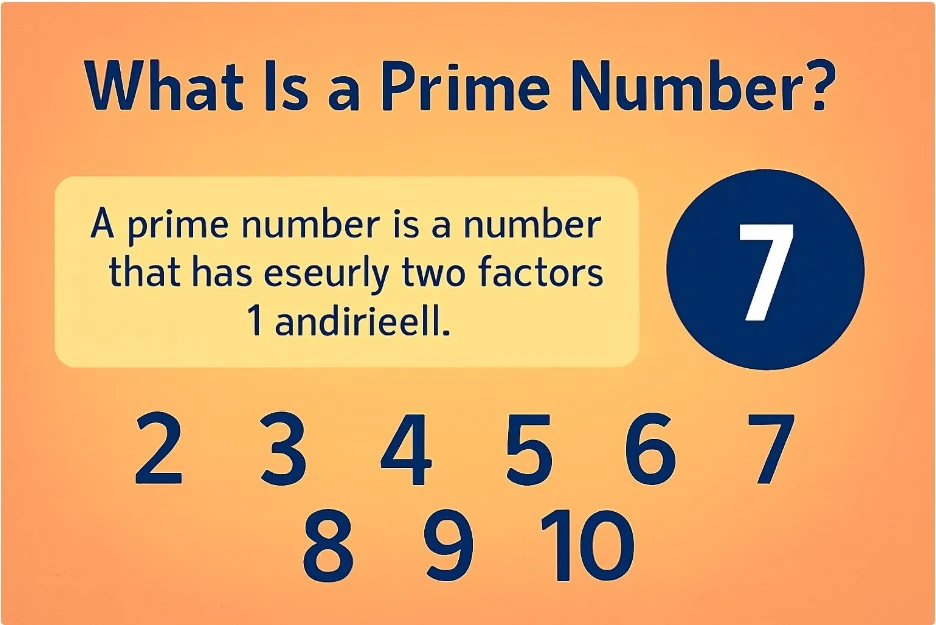Introduction to Prime Numbers: Unlocking the Secrets of Numbers
Prime numbers are the fascinating foundation of mathematics that can unlock powerful mysteries about numbers and their behavior. But what exactly What Is a Prime Number?, and why do mathematicians and scientists find them so captivating? This updated 2025 guide will dive deep into the incredible world of prime numbers, explaining their definition, key properties, importance, and surprising applications, all while answering your common questions.
What Is a Prime Number? The Ultimate Definition
Simply put, a prime number is a natural number greater than 1 that has exactly two distinct positive divisors: 1 and the number itself. Prime numbers cannot be divided evenly by any other numbers.
Examples of Prime Numbers
-
2 (the only even and smallest prime)
-
3
-
5
-
7
-
11
-
13
Numbers like 4, 6, 8, and 9 are not prime because they have more than two divisors.
Key Properties That Make Prime Numbers So Unique
Prime numbers boast special properties that separate them from other numbers:
-
Only Two Divisors: Every prime number has precisely two factors: 1 and itself.
-
Uniqueness of 2: The number 2 is unique, being the smallest and the only even prime number.
-
Infinitely Many Primes: Euclid’s ancient proof shows there is no end to prime numbers — they go on forever.
-
Fundamental Theorem of Arithmetic: Every natural number greater than 1 can be uniquely expressed as a product of prime numbers.
-
Twin Primes: Pairs of prime numbers that differ by 2, such as (3, 5) and (11, 13), are called twin primes and have fascinated researchers for centuries.
How to Identify a Prime Number Quickly and Efficiently
Determining if a number is prime can be straightforward or complex, depending on the number’s size.
The Trial Division Method
Check divisibility by all integers from 2 up to the square root of the number. If none divide the number evenly, it is prime.
The Sieve of Eratosthenes
This ancient yet efficient method filters primes up to any desired limit by iteratively eliminating multiples of each found prime.
Advanced Primality Tests for Large Numbers
For huge numbers used in computer science or cryptography, algorithms like Miller-Rabin or AKS primality tests offer reliable checks.
The Astonishing Importance of Prime Numbers in Modern Life
Prime numbers are not just mathematical curiosities—they power many real-world technologies and ideas.
1. Cryptography: Securing Our Digital World
Prime numbers underpin encryption algorithms such as RSA, which protect online banking, email, and private communications worldwide.
2. Computer Science and Algorithms
Primes contribute to hashing algorithms, pseudo-random number generation, and optimizing computations critical for software and data security.
3. A Mathematical Pillar
As the building blocks of natural numbers, primes are central to proofs, problem-solving, and exploring number theory’s deepest questions.
4. Randomization and Simulations
Using prime-based formulas helps create sequences that approximate randomness, essential for scientific simulations and modeling.
Fascinating Facts and Myth-Busting About what is a prime number
-
The Largest Known Prime Has Millions of Digits: Found through global computing projects, these primes push boundaries of math and technology.
-
Prime Numbers Occur in Nature: Cicadas emerge in cycles of prime years—like 13 or 17—to avoid predators.
-
The Riemann Hypothesis: One of math’s greatest unsolved mysteries relates to the distribution of primes and has implications across many fields.
Conclusion: Why Understanding Prime Numbers Matters in 2025
what is a prime number? Prime numbers are the unsung heroes of mathematics and technology, essential from ancient theory to today’s digital security. Understanding what is a prime number and its exciting properties helps you appreciate the intricate logic behind numbers that govern much of our world.
This guide covered the fundamentals, practical ways to identify primes, their real-world importance, and answered common queries to deepen your knowledge of prime numbers in 2025.
Frequently Asked Questions About Prime Numbers
1. Is 1 a Prime Number?
No. The number 1 has only one positive divisor, so it isn’t classified as a prime number.
2. Can Negative Numbers Be Prime?
No. Primes are defined strictly as natural numbers greater than 1.
3. Why Is 2 the Only Even Prime Number?
Because every other even number is divisible by 2, only 2 itself fits the prime definition perfectly.
Also Read: Dell support number
